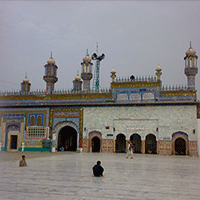Profile of Sultan Bahu
Sultan Bahu was born on Thursday, the 1st of Jamadi-us-Sani in 1039 H (17 January, 1630 A.D) at dawn, in the reign of Mughal Emperor Shah Jahan in Shorkot, District Jhang, Pakistan (then India). He belonged to the “Awan” tribe of the progeny of Hazrat Ali Bin Abu Talib. Awans are Hazrat Ali’s children from wives other than Hazrat Fatima. Sultan Bahoo’s father Bazayd Mohammad was a soldier by profession and a titleholder in Shah Jahan’s army. His mother, Bibi Rasti was a Saintly woman. She was spiritually informed of Sultan Bahoo’s grandeur and spiritual status before his birth and according to his status of Fana-Fi-Hoo (annihilation in Hoo) his name Bahoo (One with Hoo) was revealed to her. Sultan Bahoo says:
Naam-e-Baahuu maather-e-Baahu nihaad
Zaanki Baahuu daa.emii baa-‘Huu’ niihaad
(Meaning: Bahoo’s mother named him Bahoo because Bahoo has always remained with Hoo.)
Hazrat Shaikh Sultan Bahoo was a Wali (Saint, Friend of Allah) by birth. He remained engrossed in heavenly experiences and doubtless spiritual triumphs from his early age. Sultan Bahoo gained his early mystic and spiritual education from his mother.
Sultan Bahoo states in his books, “I searched for a Murshid for thirty years but in vain”. It was because he already held such elevated levels of Faqr where access of anyone is extremely arduous. Sultan Bahoo relates one of his revelations in his books that one day, engrossed in Allah’s Vision, he was wandering in the suburbs of Shorkot when Hazrat Ali Bin Abu Talib came and took him to The Holy Assembly of Prophet Mohammad where the four Pious Caliphs, Sacred Family (Ahl-e-Bait) of Prophet Mohammad and Hazrat Shaikh Abdul Qadir Jilani were also present. There, Sultan Bahoo took baiyat at the sacred hand of Prophet Mohammad who entrusted him to Hazrat Shaikh Abdul Qadir Jilani for further spiritual guidance. That is why Hazrat Sakhi Sultan Bahoo always refers Shaikh Abdul Qadir Jilani as his Murshid in his books. He says, “When Ghaus-ul-Azam Shaikh Abdul Qadir Jilani blessed me spiritually, I surpassed all the spiritual levels from eternal beginning till eternal end.”
Afterwards, following the orders of Shaikh Abdul Qadir Jilani, Sultan Bahoo took baiyat at the hand of Shaikh Pir Abdul Rehman Jilani Dehlvi who entrusted The Divine Trust of Faqr to Hazrat Sakhi Sultan Bahoo in just a single meeting. The splendour of Hazrat Sakhi Sultan Bahoo is beyond anyone's speculation. He is blessed with the extremities of Faqr and stationed at the status of Sultan-ul-Faqr.
The spiritual order of Hazrat Sakhi Sultan Bahoo is The Sarwari Qadri Order. The Qadri Order reaches Prophet Mohammad through Shaikh Abdul Qadir Jilani. There are two offshoots of Qadri Order, Zahidi Qadri and Sarwari Qadri. Hazrat Sakhi Sultan Bahoo considers only The Sarwari Qadri Order the proper and real Qadri Order.
Hazrat Sakhi Sultan Bahoo could not avail the opportunity to receive formal worldly education because he was ever absorbed in the deep Ocean of Divine Unity, even then he has written 140 books. All of his books are in Persian except the collection of his poetry which is in the form of Punjabi quatrains. Sultan Bahoo’s books are masterpieces of The Divine Knowledge.
Sultan Bahoo has not used the conventional terms of Sufism or Mysticism for his teachings; rather he calls them ‘Faqr’. Faqr is the spiritual way which leads to The Divine Knowledge and Vision of Allah. In all his books he lays emphasis on acquiring the way of Faqr under the spiritual guidance of a Sarwari Qadri Murshid. He declares the Zikr and Tasawurof Ism-e-Allah Zaat the key to the ultimate sanctity and purgation of soul after which the soul is blessed with The Divine Vision and presence in The Holy Assembly of Prophet Mohammad, which are the most elevated spiritual stations.
Shaikh Sultan Bahoo says in his books that despite of all his efforts he could not find a truly capable Seeker of Allah to whom he could entrust The Divine Trust of Faqr for the future Guidance of Seekers, so on the 1st of Jamadi-us-Sani in 1102 H (1st March, 1691 A.D) he passed away without transferring this Trust to anyone. Afterwards, Hazrat Sakhi Sultan Bahoo entrusted It spiritually to Syed Mohammad Abdullah Shah Madni Jilani. The Shrine of Hazrat Sakhi Sultan Bahoo is in Jhang, Pakistan. His urs is held on the first Thursday of Jamadi-us-Sani.
Sultan Bahoo’s writing style is very simple and easy to understand even for a less educated person. His writings are so influential that they envelop the reader completely. If these books are read respectfully after ablution, an ocean of spiritual beneficence pours down to the reader. If a reader continues reading them with complete faith and true heart, he will be guided towards the Perfect Sarwari Qadri Murshid who is the real spiritual successor of Sultan Bahoo in the present age. Sultan Bahoo’s following books are below:
(1) Abyat-e-Bahoo (Punjabi Poetry) (2) Dewan-e-Bahoo (Persian Poetry) (3) Ain-ul-Faqr (4) Majalisa-tul-Nabi (5) Kaleed-ul- Tauheed (Kalan) (6) Kaleed-ul-Tauheed (Khurd) (7) Shams-ul-Arifeen (8) meer-ul-Kaunain (9)Taigh-e-Barhana (10) Risala Roohi Sharif (11) Ganj-ul-Asrar (12) Mahak-ul-Faqr (Khurd) (13) Mahak-ul-Faqr (Kalan) (14) Asrar-e-Qadri (15) Aurang Shahi (16) Jamay-ul-Asrar (17) Aqal-e-Baydar (18) Fazal-ul-Laqa (Khurd) (19) Fazal-ul-Laqa (Kalan) (20) Miftah-ul-Arifeen (21) Noor-ul-Huda (Khurd) (22) Noor-ul-Huda (Kalan) (23) Taufeequl-Hidayat (24) Qurb-e-Deedar (25) Ain-ul-Arifeen (26) Kaleede-Jannat (27) Mohkim-ul-Fuqara (28) Sultan-ul-Waham (29) Deedar Bakhsh (30) Kashf-ul-Asrar (31) Mohabbat-ul-Asrar (32) Tarfa-tul-Ain (this book is also known as Hujjat-ul-Asrar).
Source: Risala Roohi Sharif, (English Translation)

